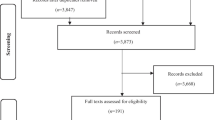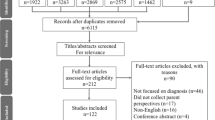Abstract
Few reports of educational and counseling support resources exist for Lynch syndrome (LS), a disorder requiring multi-organ cancer screening and specialized medical care throughout adult life. Here we describe the development and efficacy of two resources designed to address this need, the Memorial Sloan Kettering Cancer Center Clinical Genetics Service annual Lynch Syndrome Educational Workshop (LSEW), and a quarterly Lynch Syndrome Patient Advocacy Network (LSPAN) support group. The LSEW and LSPAN were implemented beginning in 2012. Participant survey data evaluating satisfaction, clarity, and unmet needs for each event were retrospectively analyzed and summarized using descriptive statistics. Annual LSEW attendance ranged from 53 to 75 total participants. LSEW year 1 participants indicated a need for a support group, and preferred in-person meetings at a frequency of every 3–6 months. For LSEW year 2–5 participants, >96 % reported satisfaction with the LSEW, and >82 % expressed interest in secure online support. Common themes for improvement included increased time for question and answer sessions and additional introductory genetics education. Responding LSPAN participants (n = 57 total survey responses in 11 meetings) found the meetings helpful (100 %), information clear (91 %), and presence of a genetic counselor useful (67 %). Desired discussion topics included coping with stress and anxiety, development of a support network, family communication about LS, genetic testing decisions, and bereavement. Following genetic counseling, a need exists for ongoing educational and emotional support in LS. Implementation of resources such as the LSEW and LSPAN is feasible and perceived as helpful by participants.

Similar content being viewed by others
References
Aarnio, M., Sankila, R., Pukkala, E., Salovaara, R., Aaltonen, L., de la Chapelle, A., et al. (1999). Cancer risk in mutation carriers of DNA-mismatch-repair genes. International Journal of Cancer, 81(2), 214–218.
Akiyama, Y., Sato, H., Yamada, T., Nagasaki, H., Tsuchiya, A., Abe, R., & Yuasa, Y. (1997). Germ-line mutation of the hMSH6/GTBP gene in an atypical hereditary nonpolyposis colorectal cancer kindred. Cancer Research, 57(18), 3920–3923.
Aktan-Collan, K., Kääriäinen, H., Järvinen, H., Peltomäki, P., Pylvänäinen, K., Mecklin, J. P., & Haukkala, A. (2013). Psychosocial consequences of predictive genetic testing for Lynch syndrome and associations to surveillance behaviour in a 7-year follow-up study. Familial Cancer, 12(4), 639–646. doi:10.1007/s10689–013–9628-9.
Arrington, M. (2010). Theorizing about social support and health communication in a prostate cancer support group. Journal of Psychosocial Oncology, 28(3), 260–268.
Bannon, S., Mork, M., Vilar, E., Peterson, S., Lu, K., Lynch, P., et al. (2014). Patient-reported disease knowledge and educational needs in lynch syndrome: findings of an interactive multidisciplinary patient conference. Hereditary Cancer in Clinical Practice, 12(1), 1.
Bauld, L., Ferguson, J., McEwen, A., & Hiscock, R. (2012). Evaluation of a drop-in rolling-group model of support to stop smoking. Addiction, 107(9), 1687–1695. doi:10.1111/j.1360–0443.2012.03861.x.
Bell, K., Lee, J., Foran, S., Kwong, S., & Christopherson, J. (2010). Is there an “ideal cancer” support group? Key findings from a qualitative study of three groups. Journal of Psychosocial Oncology, 28(4), 432–449.
Berger, J. M. (1984). Crisis intervention: a drop-in support group for cancer patients and their families. Social Work in Health Care, 10(2), 81–92.
Bonadona, V., Bonaïti, B., Olschwang, S., Grandjouan, S., Huiart, L., Longy, M., et al. (2011). Cancer risks associated with germline mutations in MLH1, MSH2, and MSH6 genes in lynch syndrome. Journal of the American Medical Association, 305(22), 2304–2310.
Bultz, B. D., Speca, M., Brasher, P. M., Geggie, P. H., & Page, S. A. (2000). A randomized controlled trial of a brief psychoeducational support group for partners of early stage breast cancer patients. Psycho-Oncology, 9(4), 303–313.
Classen, C., Butler, L. D., Koopman, C., Miller, E., DiMiceli, S., Giese-Davis, J., et al. (2001). Supportive-expressive group therapy and distress in patients with metastatic breast cancer: a randomized clinical intervention trial. Archives of General Psychiatry, 58(5), 494–501.
DeMarco, T. A., Peshkin, B. N., Mars, B. D., & Tercyak, K. P. (2004). Patient satisfaction with cancer genetic counseling: A psychometric analysis of the Genetic Counseling Satisfaction Scale. Journal of Genetic Counseling, 13(4), 293–304.
Dilzell, K., Kingham, K., Ormond, K., & Ladabaum, U. (2014). Evaluating the utilization of educational materials in communicating about Lynch syndrome to at-risk relatives. Familial Cancer, 13(3), 381–389. doi:10.1007/s10689–014–9720-9.
Dunkel-Schetter, C. (1984). Social support and cancer: findings based on patient interviews and their interpretations. Journal of Social Issues, 40(4), 98–99.
Dunlop, M., Farrington, S., Carothers, A., Wyllie, A., Sharp, L., Burn, J., et al. (1997). Cancer risk associated with germline DNA mismatch repair gene mutations. Human Molecular Genetics, 6(1), 105–110.
Emilsson, S., Svensk, A., Tavelin, B., & Lindh, J. (2012). Support group participation during the post-operative radiotherapy period increases levels of coping resources among women with breast cancer. European Journal of Cancer Care, 21, 591–598.
Esplen, M., Hunter, J., Leszcz, M., Warner, E., Narod, S., Metcalfe, K., et al. (2004). A multicenter study of supportive-expressive group therapy for women with BRCA1/BRCA2 mutations. Cancer, 101(10), 2327–2340.
Fawzy, F. I., Fawzy, N. W., Hyun, C. S., Elashoff, R., Guthrie, D., Fahey, J. L., et al. (1993). Malignant melanoma. Effects of an early structured psychiatric intervention, coping, and affective state on recurrence and survival 6 years later. Archives of General Psychiatry, 50(9), 681–689.
Galiatsatos, P., Rothenmund, H., Aubin, S., & Foulkes, W. D. (2015). Psychosocial impact of Lynch syndrome on affected individuals and families. Digestive Diseases and Sciences, 60(8), 2246–2250. doi:10.1007/s10620–015–3626-8.
Goodwin, P., Leszcz, M., Ennis, M., Koopmans, J., Vincent, L., Guther, H., et al. (2001). The effect of group psychosocial support on survival in metastatic breast cancer. New England Journal of Medicine, 345(24), 1719–1726.
Hilgart, J., Hayward, J., & Iredale, R. (2012). E-genetics: Exploring the acceptability and feasibility of using technology in cancer genetics services. Clinical Genetics, 81(6), 514–520.
Hughes, L., & Phelps, C. (2010). The bigger the network the bigger the bowl of cherries...: Exploring the acceptability of, and preferences for, an ongoing support network for known BRCA 1 and BRCA 2 mutation carriers. Journal of Genetic Counseling, 19(5), 487–496.
Jean-Pierre, P., Fiscella, K., Freund, K. M., Clark, J., Darnell, J., Holden, A.,.. . Group, P. N. R. P. (2011). Structural and reliability analysis of a patient satisfaction with cancer-related care measure: A multisite patient navigation research program study. Cancer, 117(4), 854–861. doi:10.1002/cncr.25501
Kastrinos, F., Mukherjee, B., Tayob, N., Wang, F., Sparr, J., Raymond, V., et al. (2009). Risk of pancreatic cancer in families with lynch syndrome. Journal of the American Medical Association, 302(16), 1790–1795. doi:10.1001/jama.2009.1529.
Keller, M., Jost, R., Haunstetter, C. M., Sattel, H., Schroeter, C., Bertsch, U., et al. (2008). Psychosocial outcome following genetic risk counselling for familial colorectal cancer. A comparison of affected patients and family members. Clinical Genetics, 74(5), 414–424. doi:10.1111/j.1399-0004.2008.01089.x.
Kwok, C., & Ho, M. (2011). Development and evaluation of a culturally sensitive support group programme for Chinese-Australian women with breast cancer: A pilot study. European Journal of Cancer Care (English), 20(6), 795–802.
Landsbergen, K., Brunner, H., Manders, P., Hoogerbrugge, N., & Prins, J. (2010). Educational-support groups for BRCA mutation carriers satisfy need for information but do not affect emotional distress. Genetic Counseling (Geneva, Switzerland), 21(4), 423–437.
Liu, T., Yan, H., Kuismanen, S., Percesepe, A., Bisgaard, M., Pedroni, M., et al. (2001). The role of hPMS1 and hPMS2 in predisposing to colorectal cancer. Cancer Research, 61(21), 7798–7802.
Lynch, H. (2001). Family information service and hereditary cancer. Cancer, 91(4), 625–628.
Lynch, H., & de la Chapelle, A. (2003). Hereditary colorectal cancer. New England Journal of Medicine, 348(10), 919–932.
Lynch, H., Shaw, M., Magnuson, C., Larsen, A., & Krush, A. (1966). Hereditary factors in cancer. Study of two large midwestern kindreds. Archives of Internal Medicine, 117(2), 206–212.
McGill, M., & McVittie, C. (2007). Support information and identity: Online discussions of male breast cancer patients. Health Psychology Update, 16(3), 433–456.
McGovern, R., Heyman, E., & Resnick, M. (2002). An examination of coping style and quality of life of cancer patients who attend a prostate cancer support group. Journal of Psychosocial Oncology, 20(3), 57–68.
McKinnon, W., Naud, S., Ashikaga, T., Colletti, R., & Wood, M. (2007). Results of an intervention for individuals and families with BRCA mutations: A model for providing medical updates and psychosocial support following genetic testing. Journal of Genetic Counseling, 16(4), 433–456.
Miyaki, M., Konishi, M., Tanaka, K., Kikuchi-Yanoshita, R., Muraoka, M., Yasuno, M., et al. (1997). Germline mutation of MSH6 as the cause of hereditary nonpolyposis colorectal cancer. Nature Genetics, 17(3), 271–272.
Montazeri, A., Jarvandi, S., Haghighat, S., Vahdani, M., Sajadian, A., Ebrahimi, M., & Haji-Mahmoodi, M. (2001). Anxiety and depression in breast cancer patients before and after participation in a cancer support group. Patient Education and Counseling, 45(3), 195–198.
Murakami, Y., Okamura, H., Sugano, K., Yoshida, T., Kazuma, K., Akechi, T., & Uchitomi, Y. (2004). Psychologic distress after disclosure of genetic test results regarding hereditary nonpolyposis colorectal carcinoma. Cancer, 101(2), 395–403. doi:10.1002/cncr.20363.
Plumridge, G., Metcalfe, A., Coad, J., & Gill, P. (2012). The role of support groups in facilitating families in coping with a genetic condition and in discussion of genetic risk information. Health Expectations, 15(3), 255–266.
Speice, J., McDaniel, S., Rowley, P., & Loader, S. (2002). Family issues in a psychoeducation group for women with a BRCA mutation. Clinical Genetics, 62(2), 121–127.
Spiegel, D., & Spira, J. (1991). Supportive-expressive group therapy: a treatment manual of psychosocial intervention for women with recurrent breast cancer. Stanford, California: Psychosocial Treatment Laboratory, Stanford University School of Medicine.
Spiegel, D., Bloom, J., Kraemer, H., & Gottheil, E. (1989). Effect of psychosocial treatment on survival of patients with metastatic breast cancer. Lancet, 2(8668), 888–891.
Stanton, A., Ganz, P., Rowland, J., Meyerowitz, B., Meyerowitz, J., & Sears, S. (2005). Promoting adjustment after treatment for cancer. Cancer, 104(11 Suppl), 2608–2613.
Thewes, B., Meiser, B., Tucker, M., & Tucker, K. (2003). The unmet information and support needs of women with a family history of breast cancer: A descriptive study. Journal of Genetic Counseling, 12(1), 61–76.
Vasen, H., Watson, P., Mecklin, J., & Lynch, H. (1999). New clinical criteria for hereditary nonpolyposis colorectal cancer (HNPCC, Lynch syndrome) proposed by the International Collaborative group on HNPCC. Gastroenterology, 116(6), 1453–1456.
Weis, J. (2003). Support groups for cancer patients. Supportive Care in Cancer, 11(12), 763–768.
Werner-Lin, A. (2008). Formal and informal support needs of young women with BRCA mutations. Journal of Psychosocial Oncology, 26(4), 111–133.
Yu, H. A., Lin, K., Ota, D., & Lynch, H. (2003). Hereditary nonpolyposis colorectal cancer: Preventive management. Cancer Treatment Reviews, 29(6), 461–470.
Acknowledgments
We would like to thank our patients and their families for participating in the LSEW and LSPAN, and for their valuable feedback. We also thank the Robert and Kate Niehaus Clinical Cancer Genetics Initiative at MSKCC and The Romeo Milio Lynch Syndrome Foundation for supporting this work. This research was funded in part through the NIH/NCI Cancer Center Support Grant P30 CA008748.
Author information
Authors and Affiliations
Corresponding author
Ethics declarations
Conflicts of Interest
Marina J. Corines, Jada G. Hamilton, Emily Glogowski, Chris A. Anrig, Rachael Goldberg, Kate Niehaus, Erin Salo-Mullen, Megan Harlan, Margaret R. Sheehan, Magan Trottier, Asad Ahsraf, Christina Tran, Lauren Jacobs, Rohini Rau-Murthy, Anne G. Lincoln, Mark E. Robson, Jose G. Guillem, Arnold J. Markowitz, Kenneth Offit, and Zsofia K. Stadler declare that they have no conflict of interest.
Human Studies and Informed Consent
All procedures followed were in accordance with the ethical standards of the responsible committee on human experimentation (institutional and national) and with the Helsinki Declaration of 1975, as revised in 2000 (5). For this type of study formal consent is not required.
Animal Studies
No animal studies were carried out by the authors for this article.
Rights and permissions
About this article
Cite this article
Corines, M.J., Hamilton, J.G., Glogowski, E. et al. Educational and Psychosocial Support Needs in Lynch Syndrome: Implementation and Assessment of an Educational Workshop and Support Group. J Genet Counsel 26, 232–243 (2017). https://doi.org/10.1007/s10897-016-0015-1
Received:
Accepted:
Published:
Issue Date:
DOI: https://doi.org/10.1007/s10897-016-0015-1




